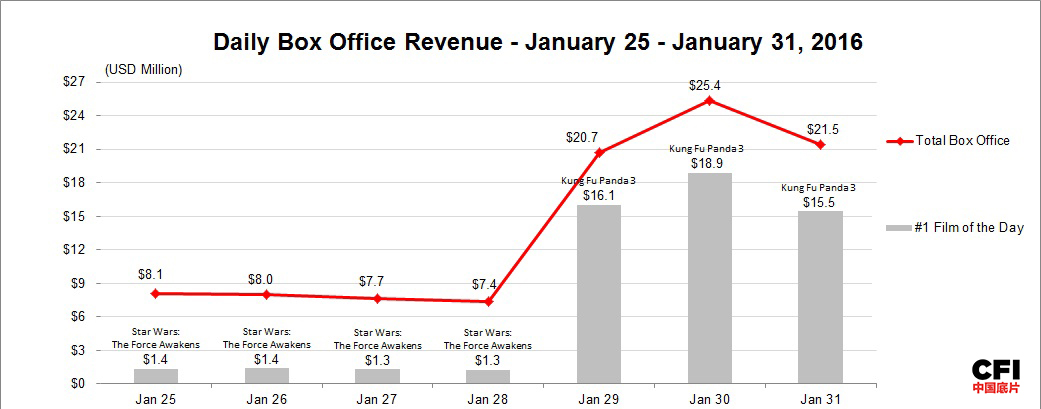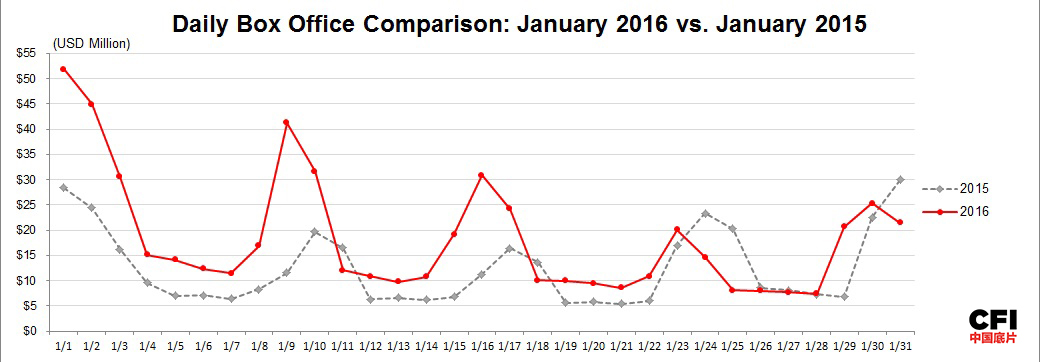Kung Fu Panda 3 (功夫熊猫3) — the first ever animated feature co-produced by the U.S. and China — got off to a strong start on both sides of the globe this weekend, dominating the box office in the two largest movie markets in the world.
DreamWorks Animation’s third entry in its successful franchise Panda-rolled to a gross of $116.7 million worldwide this weekend, according to estimates from 20th Century Fox; ticket sales in China alone grossed $58.3 million, including last weekend’s strong previews, handily besting the film’s $41 million No. 1 debut in North America.
Panda Po and his kung fu-kicking cohorts accounted for 75% of ticket sales from Friday to Sunday in China, boosting the three-day box office there to RMB 445 million ($67.6 million), a 45% increase over last weekend’s frosty low.
But many Chinese industry watchers are calling the weekend a flat-out disappointment considering the lofty expectations for the Oriental DreamWorks film, which was made in conjunction with its Hollywood partner, DreamWorks Animation. Given the nearly four-fold growth in China’s number of screens since 2011, when Kung Fu Panda 2 grossed $92 million, local box office analysts were predicting at least RMB 2 billion ($300 million) for Panda 3’s run. But after this weekend, RMB 1 billion isn’t even a guarantee.
The film has been very well-received online and excellent word-of-mouth pervades the social media conversation — cultural website Douban (豆瓣) has a rating of 8.1/10 and IMDB-esque Mtime (时光网) has it at 7.7/10.
So what went wrong then?
The problem stems from the decision to release Panda 3 one week ahead of the Lunar New Year, historically one of the slowest moviegoing periods on the Chinese release calendar.
Prior to the New Year, millions of Chinese travel back to their hometowns during chūnyùn (春运), the largest annual mass human migration in the world. Citizens are also busy preparing for the important Lunar New Year feast and shopping for gifts to bring to family members, all of which leaves little time for other leisure activities.
For Panda 3 to have a fighting chance at supplanting Monkey King: Hero is Back ($152 million) as the highest-grossing animated feature of all-time, it will have to ride its positive word of mouth each day this week. Monday estimates put Panda 3 at $7.8 million, down 50% from Sunday.
Complicating matters, however, will be the release of three homegrown potential blockbusters on the Monday, February 8 (the first day of the Chinese New Year): Mermaid, from director Stephen Chow; From Vegas To Macau, starring Chow Yun-fat, and Monkey King 2. In addition, local animated feature Mr. Nian will offer family-friendly Panda 3 some direct genre competition.
These upcoming films already have secured half of the record 220,000 screen times on New Year’s Day through partnerships with online ticketing platforms, while Oriental DreamWorks has yet to open pre-sales for its “great black-and-white hope,” and it could struggle to shore up any remaining screens.
It’s unclear who made the decision to release Kung Fu Panda 3 into the doldrums right before a holiday, but the film’s status as a U.S.-China co-production would have given DreamWorks Animation much more latitude to strategically place its signature franchise on a more advantageous date. The decision could be a costly one.
Despite Kung Fu Panda 3‘s underperformance this weekend and the muted response to Star Wars: The Force Awakens earlier this month, January’s total box office was up 47% over the same period in 2015, keeping the Chinese film industry on track for another huge year.








